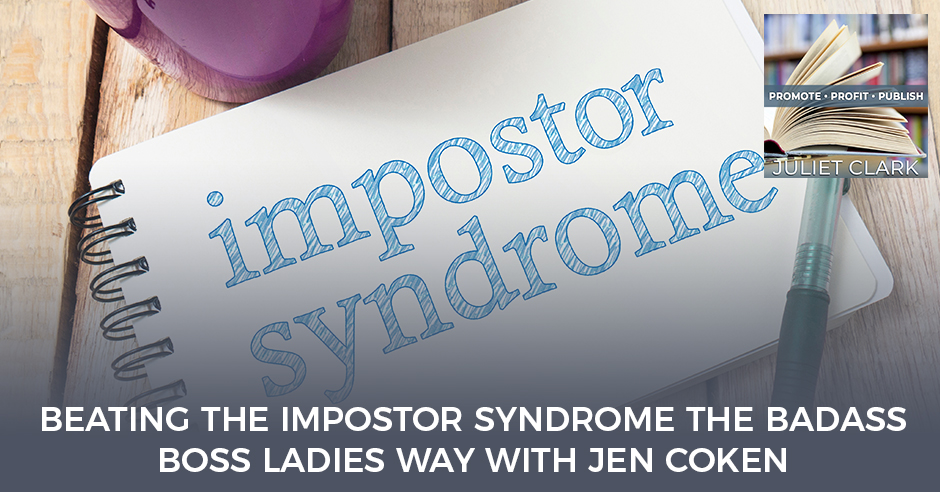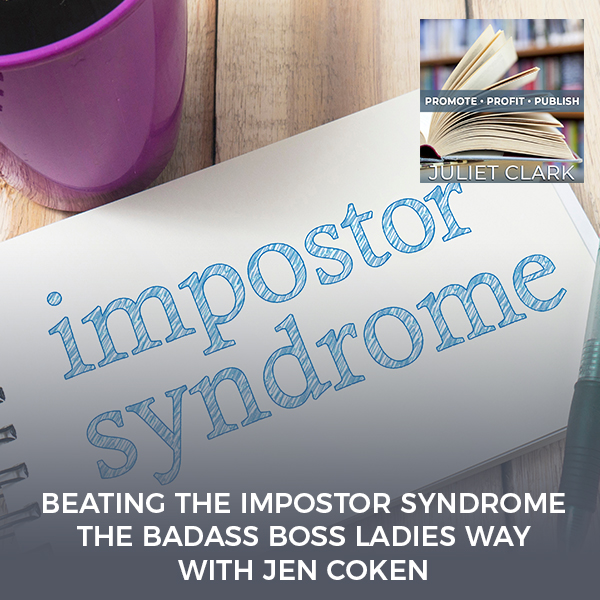
Do you feel that persistent urge to ensure that everything you say or do comes out as perfectly as you envisioned? Chances are you have the impostor syndrome – that constant urge to put up out of fear of being put down. For all the good it may have done in prodding us to productivity and excellence, we are better off without it in many ways. Joining Juliet Clark on the show, comedian, bestselling author and executive coach for Badass Boss Ladies, Jen Coken, talks about how we can start to recognize this tendency in ourselves and how we can deal with it. It all begins with the understanding that dealing with something deeply rooted in our brains and personalities calls for the creation of entirely new neural pathways through rigorous habit formation. Listen to get more of the juice.
—
Watch the episode here
Listen to the podcast here
Beating The Impostor Syndrome The Badass Boss Ladies Way With Jen Coken
The guest is a little bit different. We’re going to talk about something that is just rampant out in the world. Our guest is Jen Coken and she is the Executive Coach for Badass Boss Ladies, who were trying to smash obstacles, jump over hurdles, and grab snarling dogs by the ears. She’s also a comedian, so she’s going to have a sense of humor. For years, she’s been beating down BS with a velvet sledgehammer tasseled with humor. Jen is a nationally recognized speaker whose keynotes and training are for leaders and their teams, who crave actionable lessons from the heart, packed with a powerful punch. Her bestselling book, When I Die, Take My Panties, inspires raw, at times funny memoir about coping with her mother’s death from ovarian cancer, and what it took to push on through. When she’s not crafting bestselling books or speaking to audiences around the country, you can find her performing stand-up comedy. You work with a unique thing out there that people don’t often think about called Imposter Syndrome. I know that’s becoming more and more revealed out in the world. Can you tell us about what it is?
It was a phrase coined back in the ‘70s. Back then, the thinking was women had it worse off than men. It was meaning a lack of confidence. People who just felt like somebody would find out that they weren’t all they were meant to be. People thought women had it more than men because testosterone is also called the confidence hormone. Women must have it more than men. Dr. Valerie Young did an initial or subsequent analysis I believe in the ‘90s or early 2000. She’s done a TED Talk and we find that women and men suffer from it equally. The interesting part is a lot of people don’t think they have it, but they do. If you’re somebody who’s a perfectionist, who has to feel like you have to be the expert on a topic before you’ll open your mouth, if you have trouble delegating tasks, and keep everything to yourself because you’re worried that something will go wrong, those are all signs of certain types of imposters.
The perfectionist superwoman, and the natural-born genius. There are five different types that she went over. The other two escape me, but almost all of us have one of those things. I think often what people don’t identify with is being found out that somebody who’s going to figure out they shouldn’t have gotten to the level that they did. There are plenty of very successful people who don’t have those thoughts, male and female. Those same people also are probably very driven, perfectionist, want to be an expert, and hold things close, those are hallmarks of imposter syndrome.
What’s going on is that the latter group of people just doesn’t have the awareness because we’re all stuck in the shelter in place. I identified imposter syndrome because I binge-watched Outer Banks. One of the stars in it was all about, “I can’t commit because then you’ll figure out that I’m not who you think I am.” It’s a dramatic imposter syndrome, then she kissed him, and they ran away from the cops.
I have to check out that show. I’d never heard of it. That’s why I’m like, “What is this?”
It’s number four on Netflix. It’s a teen thing. I’m a little embarrassed that I’m watching. It’s like watching 90210.

Impostor Syndrome: If you’re a perfectionist, if you feel like you have to be an expert on the topic before you open your mouth, or if you have trouble delegating tasks – these are all signs of impostor syndrome.
That’s a classic example of imposter syndrome. We talked about this before. Part of what Dr. Young says is, “Notice it and stop thinking that way,” which is hard to just stop thinking some way because those thoughts that we’re having are habitual. Meaning, a habit is simply a belief you have that you keep thinking over and over again that becomes a habit. You automatically react to it, “This has to be perfect.” How many people have analysis paralysis? It’s got to be perfect before they send something out. “Don’t let perfection be the enemy of the good.” That’s also imposter syndrome. It’s difficult to stop thinking that way because it’s a brain pattern that you’ve created, in response to some threat.
Maybe when you were nine years old, you came home from school and had your first C ever. You showed it to your dad and your dad said, “Why’d you get the C?” You said, “That’s okay. That’s average. What’s wrong with average?” Your dad replied, “I want you to write me a 1,500-word essay on average.” Everything’s got to be perfect. That’s the way you relate to other people. If their work isn’t up to snuff and perfect, then you find fault with them. There are a lot of ways that it can impact people managing other people. The way we lead at organizations and profit, because we all know that people leave managers, not companies.
Being able to see this is important. I think one of the key things is if we can’t just switch on a dime, what do you do with it? There’s a great performance coach for a professional Olympic athlete who failed spectacularly in front of a world of people, Lindsey Jacobellis. There’s this whole story called The Haunting of Lindsey Jacobellis because years ago, she was in the front going for the gold. She did a little trick and it caused her to lose time. Somebody else got the gold and she got the silver. That’s all people are talking to her about every interview. She’s still competing as an athlete. Every time she goes to compete, it’s still like, “What happened twelve years ago, Lindsey?”
Until her coach got her this performance coach who used to coach Wall Street traders. I think this woman is my spirit animal. She’s like, “That’s stupid. Stop thinking that way. You’re not going to get over it. Go into it. Feel those feelings. Experience the embarrassment. Experience the whole thing, because what you resist will persist.” If you bring it toward you and allow yourself to sit in your poopy diaper for a hot minute, you’d be like, “I’m in a poopy diaper. Let me take this off, clean my butt, put on some clean panties, and get on my way.”
I love that you related this back to childhood because when you were giving your talk, she lays out at the beginning some of the scenarios. I could see the other people on the screen like, “I wasn’t perfect, I had my little piece picked out,” but I could see people, “That’s me.” One of the things that I thought was particularly interesting was perfection. It got me thinking about, “You used to be a perfectionist.” I got that from people-pleasing in my childhood, but then I turned around as an adult. Once I gave it up, it’s like, “I don’t care.” Is there a medium there because we say, “I do care. It’s not done. If it’s not perfect, too damn bad. Get it out there?”
I am you. When I was a little girl at six years old, my grandmother taught me how to make my bed to keep my mom happy. My mother trained me to pick up all my toys before my father came home, so he wouldn’t get angry. I learned how to do my own wash at the age of 8 and 9 to help mommy out. I was like Hannah’s helper, helping out, pleasing and perfectionism all the way. It was many years later going through personal growth and development seminar that I went, “The reason I’m obsessed with making my bed every day is I’m trying to please my mother who doesn’t live with me anymore and my grandmother who’s dead.” It’s going to keep trying to please dead people.
A lot of people don’t think they have the impostor syndrome, but they do. Click To TweetThat works, then for a month, I’m like, “I’m not making my bed.” I was like an antichrist and antithesis. I came into this moment of choicefulness and that’s what’s important. The perfectionism is an automatic brain pattern. The antithesis is automatic. It’s all reaction. I always say we’re either below the line or above the line. We don’t need to do anything. If we can recognize when we’re below the line in that reaction, we can get to the line itself and take a pause and go, “Do I want to make my bed or not? Why would I want to make my bed? What does that give me making my bed?” For me, I have a whole top tips on how to stay sane, and part of it is putting pants every day and make your bed because psychologically, it tells your brain, “Let me be productive. Let me get ready and go to work.”
I joke and say, “We all talked about the Freshman 15. You don’t want to put on the COVID-15.” Wear your pants with a button that’s going to press in your belly so you stop eating. After you notice how much weight you’re putting on because we’re all eating more, snacking and we’re cooking more at home. We’re indulging. I said to my girlfriends, “I’m the only one among them that lost 4 pounds since this whole thing.” Another friend has lost ten because she’s exercising and I’m being very conscientious.
Here’s another thing that I want to share. When I was growing up, and I’m sure my parents didn’t mean badly, but my dad used to always say, “You have no common sense.” It was because I didn’t do things the way he did. I shifted with that where I was talking about that when I was in a boardroom, when I was around 30 years old. People kept saying things like, “Juliet, why didn’t I think of that?” That realization came along. That limiting belief that had caused that perfectionism was because it was his definition of common sense, not my definition of common sense. I had a different reality. He could take and put anything together with his hands. Take it apart, put it back together, very creative with his hands. I was creative with my mind. What is your view on this? Is that something that parents quite often put on their kids, those limiting beliefs in ways that they don’t even realize?
We can’t protect our kids from that. We couldn’t be protected from that. We’re being human. We’re being parents the way we learned from our parents or not learned from our parents because maybe our parents sucked. We want to do it a different way or we saw some examples of great parents or great teachers. As human beings, we don’t see facts or data. We’re always interpreting through a lens, through a filter that we’ve put on like a pair of yellow ski goggles. I cycle. If I’m cycling in the summer and it’s dark out because it’s overcast, I’m going to put sliders. I’ve got a clear, dark, yellow and orange pair. I might put on my yellow lenses into the glasses. I’m cycling along and we stop. People are talking about why I look like random. I’m like, “What are you talking about?” I take off my glasses. I’m like, “It’s super overcast. We’d better put pedal to the metal and get back to the parking lot before it starts pouring.” That’s how it is for us as human beings.

Impostor Syndrome: It’s very difficult to stop thinking like an impostor because it’s a brain pattern that you’ve created in response to some threat.
We have viewpoints about things that we don’t realize our viewpoints. We’re always interpreting everything that’s coming with us before it enters our brain through these viewpoints. It’s important to separate fact from fiction. That’s what you did sitting in that boardroom, “If my dad told me I had no common sense,” but you’re saying that’s a good idea. “Let me reevaluate that assumption I made about myself based on something my father said to me.” Your dad didn’t have a malicious bone in his body. He was saying a thing. We don’t mean anything by it. It’s the way we as humans interpret the information coming at us that leads to all suffering. Suffering is in our stories, viewpoints, and interpretations. Buddhists say, “Suffering is optional.” It is so. If you can deal with what’s right in front of you, the facts are the who, what, where and when, and separate it from your story, your suffering is going to disappear.
You’ve made me aware that I have this on a certain level, and I do that well within your talks. Once you’ve assessed that, is it something that you can get rid of by yourself? Is it something that some of it can go away? If it’s deep-seated, it needs help. How do you figure out what to do with it?
I don’t have a straightforward answer to that. The first step is recognizing you have a problem in so many words, “Oh. Huh.” That’s imposter syndrome. You want to play the game called Catch It, not just within yourself, but out in the world. It’s the same as you did. I was watching a show and this woman said this. That’s imposter syndrome. The first car that I bought, I was certain that nobody owned a silver Honda so that’s what I bought. I proudly drove my brand new first ever car that I purchased off the lot and got on the highway. I was, “Silver Honda.” All of a sudden, everywhere I saw were silver Honda’s.
It is like you can see dead people. Once you recognize it, you want to get good at seeing it. Not just in yourself, it’s going to be hardest to see it in yourself. That’s why you get a coach because then that coach can help you drill it down. You start seeing it elsewhere. You don’t start, “You, that’s imposter syndrome.” Notice it. Isn’t that interesting? Be curious about it and wonder where this comes up. “I noticed that within me, what triggered it?” It’s always a response to the threat. “What was the threat that I perceived?” When you can get good at noticing it, then you can be in a moment of choice. “If I’m not going to be the perfectionist or the helper, who am I going to be?”
Going back to my bed analogy, I’m going to be somebody who loves integrity in my space. I know for me when things are put away, my mind feels less cluttered. I also know that’s the start to my day because I’ve worked at home for four years. Making my bed is important to me as that moment of starting my day. The same with showering, makeup, pants, all those things and I’m specific in my day. Catch and start seeing it in other people because you see it there first. Don’t point fingers, then get good at catching it in yourself and start to notice, “What triggered that? Why did that come up?” Be curious, “Was that some form of imposter syndrome? Was that why I thought that?” It’s not bad or wrong that you have it. It means you’re a human being.
It’s starting that recognition. I love what you say that don’t call it out. You’re not going to make friends if you walk up and go, “Jen, I think you have imposter syndrome. What are you doing about it? Are you seeing someone?” It’s not a great way to start a conversation.
We don't just see facts. We're always interpreting them through a filter. Click To TweetYou won’t win friends or you won’t be asked to the next networking event.
I’m always curious about this. When you see people that have it, if you said, “Jen, you’re so,” then you throw something out there that you’re so something. You think later, “That’s me, that reflective thing.” When you see that imposter syndrome in someone else, is that a cue that maybe you’re reflecting something you need to look at?
It could very well be. They say when you point a finger at someone else, three fingers are pointing back at you. That’s that old adage. For me, I have found this with the people that I’ve coached. The things that annoy us the most are the things that we have little space for in our self. I have a client, this particular person, she has no compassion for. At the crux of it is she has a little compassion for making mistakes herself. She has that perfectionist. When she calls it out in other people, it’s from this reactive moment.
I said, “What would it be like if you got curious about what would have other people win? Not win for you, but when everybody around you is winning. What would that look like as a manager, as a leader at your company? How would that change the culture? How about take the case that anything that bugs you about anybody else something that bugs you about you?” I have found, is the case 100%? Probably not, but the exception proves the rule. We can all find an exception to anything. For the most part, if something annoys you or you were like, “That’s probably a good time to look back at you.” Maybe you’ll find, “No, that’s not me. Good for me for recognizing it.” Maybe you’ll get a deeper cut to something you’ve already discovered.
Have you ever got stuck? How did you deal with it?
There have been plenty of times when I’ve been super stuck. I have the people that I call when I’m stuck. I have to have those people I call because this is a dangerous neighborhood to go by yourself. Whenever I am in it, I’m on my viewpoint. I think my viewpoint is right. I have somebody that I’ve been talking to for years. Every day, Monday through Friday for fifteen minutes to create our day together. We listen to what’s going on in each other’s lives and we will say, “Can I contribute something? Here’s what I hear. I think you’re stuck in a review point.” I’m human. I get stuck all the time and I rely on my own coaches and my colleagues. I have a certain set of people that I call when I’m at my worst. I trust that they won’t do anything with what I’m saying. They will listen very intently. Whatever I’m saying, especially if I’m complaining about somebody else that they may or may not know, it won’t shift their opinion of that person because they’re holding the bucket for me to verbally vomit.
They’ll ask me particular questions that will be key for me. I’m walking where I’m at. I did this, I know it was the first night of Passover. I live by myself. I’m usually with friends from Passover. Jewish holidays are very community-driven. I was literally on my knees, overcome with grief, pissed off about the pandemic, and being at home. I didn’t want anyone to feel sorry for me. I wanted to get somebody to get all my grief about the whole thing. I called somebody in particular. I said, “I just need you to hear me.” I did, then she did. I was done. I went to the store, bought food, made myself my own Seder and found a Zoom Seder with 237 other people from a local synagogue that I had that night. When you get stuck, sometimes you want to lay on it for a while. Sometimes you want to get coaching. Sometimes the whole key for any of it to let it go is to be returned to power so that you’re fully able to contribute your gifts in the world because we’re stuck in reactivated trying to be a perfectionist, etc. We are not 100% fully grounded, strong, and our conviction to contribute our gifts to the world.

Impostor Syndrome: Allow yourself to experience embarrassment. What you resist will persist.
I know sometimes when I get stuck, I sit in it and I literally have to say, “Not making a choice is a choice.” I don’t think sometimes when we get stuck that we realized that wavy gravy land we’re in not making a choice is a choice.
That’s fine. As I say, habit over for drinks, just don’t let it sleep in your bed because you’ll regret it in the morning.
Is that a, “Don’t be a choice,” look?
No. I’m saying sit in it. Make sure before you go to bed that you deal with yourself. In some way, shape or form either say, “I’m going to sit with this overnight, but I’m going to get back to work tomorrow or I’m going to call somebody.” Whatever you are reacting to that was probably a moment of an upset five-year-old. You go to sleep with it. What happens from a neuroscientific perspective is that it begins to ingrain a new neural pathway in your brain. Wayne Dyer used to talk about why it’s important to think about gratitude before you go to sleep. “What are the things I chant is I’m healthier and happier in every way, every day.” That was one of his mantras because he went through bouts of cancer. “I’m healthier and happier every day in every way.” I keep saying that to myself and I keep thinking about that for the planet and chanting that when I’m going to sleep at night. “Let us come out of this kinder and gentler.”
I don’t see that happening, but let’s try. Do you see it happening? In some places and other places, I don’t. I don’t know that there’s a solution for that other than voting those people out of office. Who exactly do you work with?
Without naming names, I work in the telecom industry, communications industry, and the pharmaceutical industry. What happens is people start referring me. I work with some entrepreneurs. Usually, I’m out speaking and people will hear me speak and then come up to me and ask me as I talk about that I coach people and do they want to talk to me one-on-one. Those seem to be the three major industries. I worked for a long time in the energy industry. I know what it’s like to be a female at the top and the only female at the table with a room full of men. How not to fall back on the unconscious male tendencies of arrogance interruption but to embody the conscious, feminine, divine divinity that we have, of creating team, interdependence, communication, trust, and vulnerability. I’ve been down that road. I’ve totally screwed it up. I’m not screwed up anymore, so I can speak to it and coach those kinds of people.
I have been as well. I broke through that glass ceiling back in the ‘80s. When I hear people talk about it, I think I survived the ‘80s. I don’t want you to know I whine about it. You’re probably around the same age where it was a lot different than it is now. These ladies have it so much easier. If somebody wanted to get in touch with you, how do they work with you? Where can they find you?
My website is JenCoken.com. I’m doing a lot of virtual speaking gigs. If people want to hire me to do something on imposter syndrome, I’m doing it on StrengthsFinder. I’m doing one on the Top 10 Tips to Stay Sane. I’ve done weeks of free webinars on How to Harness Your Anxiety to Achieve Your Goal. There’s a way to get in touch with me there. I also coach clients. If you go up to Executive Coaching, you’ll see my process. Here are the six steps that I bring people through. I always do a free 30-minute call with anybody. It’s a sprint coaching call. We’ll automatically dig into, “What’s up with you?” If you get value from it and you feel like we’ve been a good fit, we can then talk about whether people want to hire me. That’s how they get in touch with me. They can also send me an email at Jen@JenCoken.com. See me on LinkedIn, Facebook, Twitter, Instagram, and YouTube, Jen Coken.
It’s hardest to see the impostor syndrome in yourself. Click To TweetThank you so much for being on. We appreciate having you. Before you go, you’ve got to tell us a joke. You’re a comedian.
What did the zero say to the eight?
I have no idea.
“Hey, nice belt.”
Thank you.
Thank you for having me.
Important Links
- When I Die, Take My Panties
- TED Talk by Dr. Valerie Young
- JenCoken.com
- Executive Coaching
- Jen@JenCoken.com
- LinkedIn – Jen Coken
- Facebook – Jen Coken
- Twitter – Jen Coken
- Instagram – Jen Coken
- Jen Coken – YouTube
About Jen Coken
 Jen Coken is the executive coach for Badass Boss Ladies, who are ready to smash obstacles, jump over hurdles, and grab snarling dogs by the ears. For twenty years, she’s been beating down BS with a velvet sledgehammer tasseled with humor. Jen is also a national speaker whose keynotes and trainings are for leaders and their teams who crave actionable lessons from the heart, packed with a powerful punch. Her best-selling book, “When I Die, Take My Panties,” is an inspiring, raw, and at times, funny memoir about coping with her mother’s death from ovarian cancer and what it took to push on through. When she’s not crafting bestselling books or speaking to audiences around the country, you can nd Jen performing stand-up comedy, or, eating Nutella by the spoonful in the nearest grocery aisle.
Jen Coken is the executive coach for Badass Boss Ladies, who are ready to smash obstacles, jump over hurdles, and grab snarling dogs by the ears. For twenty years, she’s been beating down BS with a velvet sledgehammer tasseled with humor. Jen is also a national speaker whose keynotes and trainings are for leaders and their teams who crave actionable lessons from the heart, packed with a powerful punch. Her best-selling book, “When I Die, Take My Panties,” is an inspiring, raw, and at times, funny memoir about coping with her mother’s death from ovarian cancer and what it took to push on through. When she’s not crafting bestselling books or speaking to audiences around the country, you can nd Jen performing stand-up comedy, or, eating Nutella by the spoonful in the nearest grocery aisle.
Love the show? Subscribe, rate, review, and share!










Leave A Comment